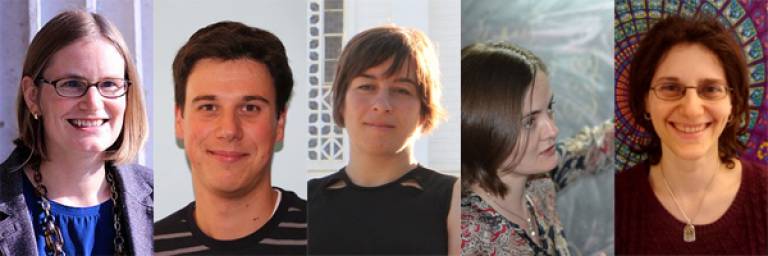UCL leads UK with most Philip Leverhulme Prize winners
27 October 2016
Five researchers from UCL Geography, UCL Economics, UCL Hebrew & Jewish Studies, UCL Computer Science and the UCL Bartlett Developmental Planning Unit have been awarded 2016 Philip Leverhulme Prizes.

The prizes, each worth £100,000, are awarded annually by The Leverhulme Trust across a range of disciplines. They recognise "the achievement of outstanding researchers whose work has already attracted international recognition and whose future career is exceptionally promising". Just 30 researchers from universities across the UK receive the award each year, and UCL received more of the awards than any other institution.
2016 prizes were given to:
• Professor Uta Schönberg (UCL Economics)
Professor Schönberg conducts research in applied microeconomics, with a focus on labour economics. She's currently investigating the effects of immigration on labour markets following the fall of the Iron Curtain; spillover effects of mass layoffs; and effects of universal child care programs.
• Dr David Thornalley (UCL Geography)
Dr Thornalley's research seeks to understand the causes and mechanisms of climate change on decadal to millennial timescales, with a focus on how the circulation of the North Atlantic has changed in the past in relation to abrupt climate change.
• Dr Vanesa Castán Broto (UCL Bartlett Developmental Planning Unit))
Dr Castán Broto's research into cities, innovation, and climate change is directed towards achieving socially and environmentally just development in cities in the global south through environmental governance and planning.
• Dr Alexandra Silva (UCL Computer Science)
Dr Silva's research focuses on semantics of programming languages and modular development of algorithms, partly drawing on coalgebra, a mathematical framework established in recent decades.
• Dr Lily Okalani Kahn (UCL Hebrew and Jewish Studies)
Dr Kahn's research focuses on various linguistic aspects of Hebrew in Eastern Europe, including grammatical analysis of Maskilic (Enlightenment) and Hasidic Hebrew, the influence of Yiddish on Ashkenazi Hebrew, and translations from European languages into Maskilic Hebrew.
In 2016 the Trust offered five prizes in each of the following subject areas: Archaeology; Chemistry; Economics; Engineering; Geography; and Languages and Literatures. Each of the 30 prize winners receives £100,000 which can be used over two or three years to advance their research.
In 2017 the Trust will invite nominations for prizes in Biological Sciences; History; Law; Mathematics and Statistics; Philosophy and Theology; and Sociology and Social Policy. The Trust's online grant application system will open to nominations for the 2017 subject areas from 1 January.
Links
- About the Philip Leverhulme Prize
- Full list of 2016 Philip Leverhulme Prize winners
- Professor Uta Schönberg's website
- Dr David Thornalley's academic profile
- Dr Vanesa Castán Broto's academic profile
- Dr Alexandra Silva's website
- Dr Lily Okalani Kahn's academic profile
- UCL Arts & Humanities announcement with Dr Thornalley's response
Image
- Professor Uta Schönberg, Dr David Thornalley, Dr Vanesa Castán Broto, Dr Alexandra Silva, Dr Lily Okalani Kahn
 Close
Close

